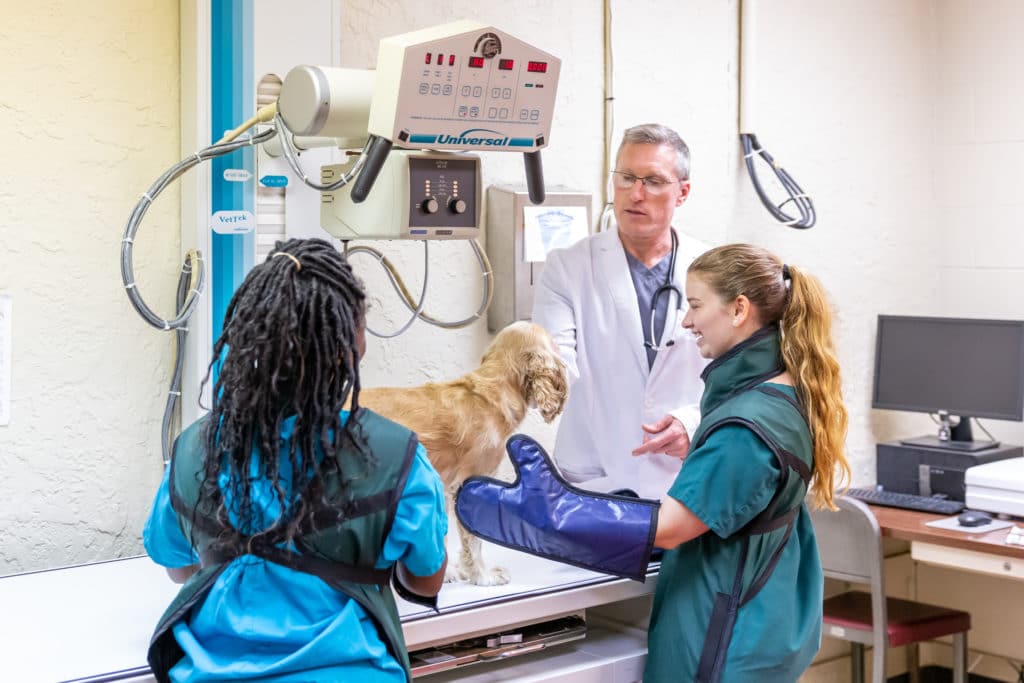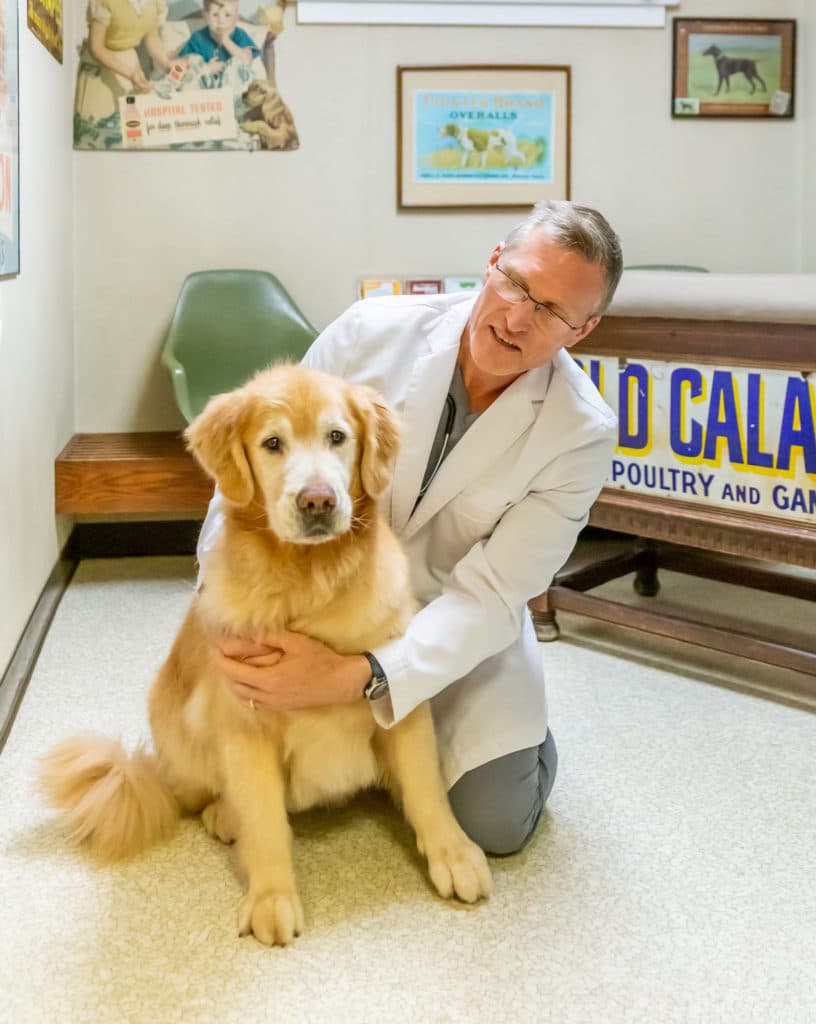Vomiting in dogs is a common sign of inflamed intestines or an irritated stomach. While vomiting in dogs is unpleasant to witness, it’s typically natural.
Signs you should take your vomiting dog to the vet:
- Lethargy
- Sudden Weight Loss
- Fever
- Anemia
- Suspicion of ingesting a foreign agent
- Constant dry heaving
Your Dog is Throwing Up—Now What?
Table of Contents
- 1 Your Dog is Throwing Up—Now What?
- 2 First, Is Your Vomiting Dog an Emergency?
- 3 Quick Answer – When is My Vomiting Dog an Emergency?
- 4 Quick Answer – When Should My Vomiting Dog Go To the Vet?
- 5 Age-Related Vomiting: What to Watch for in Puppies and Senior Dogs
- 6 When Is a Dog Vomiting Normal?
- 7 Is It Vomiting or Regurgitation? How to Tell the Difference
- 8 What Does the Color and Look of a Dog’s Vomit Mean?
- 9 What Can You Do for Your Vomiting Dog?
- 10 What Can You Do for Your Vomiting Puppy?
- 11 Hydration and Vomiting: When Is Dehydration a Concern?
- 12 Why is My Dog Vomiting? The Most Common Reasons:
- 13 What Can You Do for a Vomiting Dog at Home?
- 14 Backtracking Your Dog’s Activities
- 15 Frequently Asked Questions
- 16 When to Take Action for Your Vomiting Dog
Why is your dog not eating? When shsould you be concerned about your dog’s throwing up? Maybe your pup has an upset stomach and is throwing up yellow liquid. It’s never easy having a vomiting dog in the house. As much as we want to help alleviate the pain, our dogs can’t tell us what all their symptoms feel like.
One of the clearest signs that dogs can give us that something is wrong is vomiting when they feel sick—it’s up to us to fiqure out if the cause is eating the wrong table scrap, a more serious underlying health condition, or an emergency.
With a vomiting dog when to call the vet is many people’s primary concern. Keep reading to find out when vomiting is an emergency when to call the vet, and about the many possible reasons why your dog is throwing up.
First, Is Your Vomiting Dog an Emergency?
From an upset stomach to a more serious medical issue, vomiting is a fairly common symptom in dogs. Non-stop vomiting or non-productive retching is an emergency. It’s also an emergency if vomiting or dry retching is frequent (e.g. more than 4 times), is associated with a bloated belly, or is accompanied by extreme weakness. Bloat (gastric dilatation-volvulus,) poisoning, toxin ingestion, and heat stroke are definitely examples of when your vomiting dog should be taken to the emergency vet immediately.
The veterinarians at Paoli Vetcare will always make time to see a pet in need of urgent care—call Paoli Vetcare or set up a telemedicine appointment. Call and we will help you determine the best course of action.
Quick Answer – When is My Vomiting Dog an Emergency?
- Repeated non-productive vomiting a.k.a. “dry heaves”
- Abdominal distension or bloating
- Not drinking for more than 1 day—a small amount of water causes vomiting
- Projectile vomiting
- Severe lethargy, non-responsive, or collapsed
- Very pale or white gums
Quick Answer – When Should My Vomiting Dog Go To the Vet?
- You can’t determine an obvious benign reason for it—e.g. diet change—more details follow
- It’s not “normal vomiting” as described below
- Vomiting multiple times in one day—e.g. greater than 3-4 times
- Vomiting after eating garbage or especially high-fat foods—e.g. bacon, cooking grease, fast food
- Black vomit, which indicates digested blood—a small amount of red blood is okay
- Loss of appetite for more than 2 days
- Not urinating
- Abdominal pain
- Unexplained weight loss
- Fever of 103 degrees or higher
- Pre-existing medical conditions
- Very old dogs or young puppies—take extra precautions and call your vet for advice
Vomiting in Puppies
Your puppy might be vomiting for many reasons, from more serious medical conditions to something they ingested. It can be tough to tell what’s causing your pup’s upset stomach, but the best way to figure out what’s going on is to take your puppy to the vet. Your local veterinarian can make sure the vomiting isn’t serious, plus they can find the underlying causes.
Puppy vomiting can be caused by:
- Viruses
- Bacteria
- Intestinal parasites (tapeworms, hookworms, roundworms)
- Stress
- Swallowing things
- Eating toxic items
- Sudden dietary changes
- Chronic disease
If your puppy is vomiting, it’s important to take them to the veterinarian. Tell your veterinarian if you’ve noticed any additional signs, such as blood in their vomit or stool, or if they’ve been vomiting for 24 hours or longer. These could be signs of dehydration or other serious issues. Avoiding rapid dietary changes or access to toxic substances are preventative measures that can reduce the chance of your puppy having gastrointestinal distress.
Vomiting in Senior Dogs
While vomiting can be worrisome for puppies, it can be much more dangerous for senior dogs who already have other health issues. Vomiting is severely dehydrating and can lead to other problems and illnesses. Many cases of vomiting can be effectively treated with timely intervention from a vet.
If your senior dog appears sick, call your local veterinarian. They’ll ask you about your dog’s health to determine how serious the vomiting is. It’s important to pay attention to additional details such as when your dog started vomiting and how many times they’ve vomited. Vomiting undigested food, yellow bile, or blood in senior dogs is a serious concern. These signs should be addressed by a veterinarian immediately.
When Is a Dog Vomiting Normal?
Many people with a sick pup ask the question—when should you be concerned about your dog throwing up?
If your dog is vomiting, when to call the vet is probably first and foremost on your mind. However, you may not have to worry. In certain situations, vomiting can be a perfectly normal, even “healthy” reaction to rid the
GI tract of a harmful substance.
You should know when to expect vomiting from your dog to avoid any unnecessary trips to the vet. It’s perfectly normal for a dog to throw up after eating too much or too quickly. Certain snacks, even when nontoxic, can also be disagreeable to some dogs. In general, you shouldn’t worry about an isolated incident of vomiting.

Is It Vomiting or Regurgitation? How to Tell the Difference
Regurgitation can be easily confused with vomiting. While vomiting is the ejection of the stomach’s contents, regurgitation is only the ejection of the esophagus. Regurgitation can sometimes happen directly after eating, and dogs being who they are, will try and eat regurgitated food. Vomiting occurs after eating when food has been semi-digested.
What Does the Color and Look of a Dog’s Vomit Mean?
A dog may vomit up clear, yellow, green, red, or brown colored liquid to semi-solid material—it may be just foamy if they’re vomiting on an empty stomach. Dog vomit may contain food or plant material—these types of vomit are perfectly natural and—more often than not—no cause for concern. If there is a foreign body in the vomit, you will need to keep watch to make sure all of it is expelled. It’s a good idea to keep an eye on any dog that vomits, no matter what the vomit looks like.
- Bright green or teal vomit—your pet may have eaten rodent poison—call theASPCA Animal Poison Control Center (APCC)
- Bright red vomit—if only a small amount or streaks of blood it’s not usually an emergency
- Gastritis, ulcers, inflammatory bowel disease—inflammation of stomach lining
- Poisoning—e.g. rat poison
- Bone or other foreign body
- Trauma—e.g. hit by car
- Clotting problem—if a lot of blood then this is an emergency
- Heat Stroke
- Viral—parvovirus
- Dark brown to black “coffee grounds” vomit—digested blood—make an appointment with your vet
-
- Poisoning
- Ulcers
- Intestinal blockage
- Tick-borne diseases
- Cancer
- Viral
- Light to Dark brown vomit
-
- chocolate ingestion—an emergency and you should call poison control
- Mud or dirt—usually upsets the stomach but isn’t an emergency
- Intestinal blockage—vomits repeatedly or over a long time
- 💩 Poop—in which case it will have a telltale smell and is not an emergency. Coprophagia, or poop-eating, should always be discouraged because your dog can pick up infectious or parasitic diseases doing it.
- White vomit—usually this is foam which could be nothing or an emergency
-
- GDV or gastric dilatation-volvulus—a serious medical, often surgical, emergency condition. With bloat the stomach fills with gas and then may twist—as a result, the blood supply can be cut off, breathing may become difficult, and the stomach may rupture. Bloat is rapidly progressive and life-threatening—head to a 24-hour emergency vet immediately. Symptoms:
- an anxious look or looking at the belly
- standing and stretching
- drooling
- distended belly
- retching without producing any vomit
- Gastritis—vomits a small amount of foam ± grass, often if your pup hasn’t eaten in a while. May vomit 2-3 times, but otherwise looks normal.
- GDV or gastric dilatation-volvulus—a serious medical, often surgical, emergency condition. With bloat the stomach fills with gas and then may twist—as a result, the blood supply can be cut off, breathing may become difficult, and the stomach may rupture. Bloat is rapidly progressive and life-threatening—head to a 24-hour emergency vet immediately. Symptoms:
What Can You Do for Your Vomiting Dog?
If you determine there’s no cause for worry, you may still be wondering—how do you settle a dog’s upset stomach? In some situations, it may just be best to let your buddy ride the sickness out. However, many owners want to ease their dog’s pain and wonder what to give dogs for vomiting?
There are a couple of home remedies you can try if you have a vomiting pet. Ice cubes are an excellent way to help your dog stay hydrated without giving them water, which may trigger more vomiting. The protocol for home treatment of your vomiting dog will be discussed in detail after we cover the reasons your dog might be vomiting.
What Can You Do for Your Vomiting Puppy?
If your puppy is vomiting, it can be very worrying and stressful. You mustn’t give your puppy anything by mouth for two to four hours after they vomit, and only offer them room temperature water or ice cubes for them to lick to ensure they stay hydrated.
You can give your puppy a bland meal such as ground turkey or plain chicken. Don’t give your dog any medication without consulting your vet first, and if they don’t vomit again, it’s likely a one-time thing, enabling you to return your puppy to their regular diet.
Contact your veterinarian right away if the vomiting persists, your puppy doesn’t get better, or you notice other issues.
Why is my puppy throwing up puppy throwing up food?
Overeating, anxiety, or eating too quickly can cause your puppy to throw up. Food poisoning can also be an issue, causing your puppy to throw up undigested food. If there’s blood in the vomit your puppy’s stomach could be ulcerated, or there could be an issue with the intestines.
Why is my puppy throwing up worms?
Puppy parasites are fairly common, and a case of worms can cause your puppy to vomit. You might see the worms in their vomit or poop, as little brown specks like coffee grounds. Common intestinal parasites include roundworms, whipworms, Coccidia, and Giardia. If you suspect worms, make an appointment with your veterinarian ASAP to deworm your pup.
Why is my puppy throwing up with diarrhea?
If your puppy is exhibiting other signs of illness aside from vomiting, they might have more severe issues such as a viral infection or stomach blockage. Vomiting and diarrhea, repeated vomiting, vomit that contains blood, prolonged hiccups, and lethargic or confused behaviors are all signs of a more serious illness.

Hydration and Vomiting: When Is Dehydration a Concern?
If your dog is vomiting, they might be dehydrated. In mild cases of dehydration, you can give your dog small doses of water every few minutes. It’s important they not drink too much, which can induce vomiting.
Signs of dog dehydration include:
- Heatstroke
- Insufficient fluid intake
- Persistent vomiting
- Diarrhea
You should immediately treat your pet if you believe they are suffering from dehydration. Call your veterinarian if your dog is displaying signs of heatstroke or shock, as they can advise you on what steps to take next. Dogs suffering from extreme dehydration are treated with intravenous fluids, but rehydration is an important process that needs to be taken seriously.
If your dog is severely dehydrated, they need emergency services. Contact both your veterinarian and the nearest animal emergency center. Inform them you are on your way and they will tell you exactly what you need to do.
Why is My Dog Vomiting? The Most Common Reasons:
Most Common Causes of All Types of Vomiting in Dogs
- Dietary problem—Any recent changes in your dog’s diet?
-
-
- Indigestion—e.g. table scraps or your dog got into garbage
- Food adverse reaction or dietary sensitivity
- True food allergy
-
- Parasites—Take a stool sample to your veterinarian for microscopic examination.
- Drug reactions—Have you given any over-the-counter or prescription medications?
- Metabolic Disorders—Your pup needs to go to the vet for blood work
-
- Kidney disease
- Liver disease
- Electrolyte imbalances—e.g. gland disorders
- Pancreatitis
Most Common Causes of Chronic Vomiting
- Intestinal motility disorders—e.g. slow stomach emptying
- Inflammatory disorders—e.g. inflammatory bowel disease
- Obstructive disorders—e.g. foreign body (sock, part of chew toy, rock, etc.)
- Neoplasia—occurs with many different types of cancer
Less Common Causes of Vomiting in Dogs
- Viral or bacterial infection—e.g. parvovirus, salmonellosis, or pyometra (uterine infection in unspayed females)
- Toxins—plants like ivy, tomatoes, holly, baby’s breath, milkweed, azaleas, tulips, and many other common flowers
- Poisons—e.g. antifreeze (ethylene glycol,) insecticides, or nonsteroidal anti-inflammatory drugs (Aleve, Advil, Motrin, Previcox, etc.)
- Neurologic—e.g. encephalitis, vestibular disease, tumor

What Can You Do for a Vomiting Dog at Home?
Dietary Changes
If you’ve recently changed your dog’s food or added a new brand into the mix, it could cause vomiting. It’s best to introduce dogs to new foods slowly, especially if it’s their main protein source. Mix the new food in by replacing a quarter of the serving on the first day, half on the third day, three-fourths on the 5th day, then all new food after a week.
If your dog is still throwing up new kibble, wet food, or treats after a while, there may be an ingredient in there that doesn’t agree with them. A veterinarian will be able to determine the best course of action if this is your situation.
Bland Diet as a Therapy
A dog with short-lived vomiting (+/- diarrhea) can be treated at home with a prescribed meal plan. Start with nothing by mouth for 12-24 hours. If vomiting has ceased, over a small amount of water (e.g. ¼ cup) three hours after the last vomiting episode. If there’s still no vomiting after three more hours, offer a small amount of water again. Continue to offer water like this for the first 24 hours as long as vomiting doesn’t return.
The next day, offer a small amount of a bland diet (e.g. 1-2 tablespoons) every 2-3 hours. If your dog is keeping this down, increase the amount, but decrease the frequency—e.g. ¼ -½ cup every four hours. Stick with a bland diet for a few days after both vomiting has stopped and stool has returned to normal. Return to a normal diet slowly as described above in “Dietary Changes.”
What toFeed a Dog that’s Throwing Up – Bland Diet Recipe
2:1 ratio of starch (carbohydrate) to lean meat (protein.) The most commonly prescribed recipe is 2 cups of cooked white rice mixed with 1 cup of boiled boneless, skinless chicken breast. There are plenty of alternate sources of starch and protein:
- Starch
-
- Baked, peeled sweet potato
- Oatmeal
- Pasta
- Brown Rice
- Lean Meat
-
- Boiled ground sirloin (lowest fat)
- Boiled turkey
- Poached fish
- Cottage cheese
- Scrambled eggs (use the tiniest amount of fat possible to fry)
Foreign Bodies Commonly Cause Vomiting
Dogs can be voracious eaters, and some don’t discern between the edible and inedible. If your dog has eaten something they can’t digest, such as a piece of clothing or a part of a chew toy, they’ll likely vomit it back up. Monitor closely if you suspect they’ve swallowed an indigestible object. You should check and make sure that they do expel the foreign object either by vomiting or bypassing it in their stool. If it becomes lodged in the GI tract it will lead to vomiting that persists.
Medical Conditions often seen with Vomiting
A long list of medical conditions can cause chronic vomiting in dogs. Diseases of organs like the liver, intestines, kidneys, pancreas, or even the brain can lead to vomiting. Constipation, intestinal obstruction, colitis, and intestinal inflammation may also be the root cause. Many different types of cancer cause vomiting, as can certain infections. It’s best to speak with your local veterinarian at an AAHA-accredited animal hospital to get a proper diagnosis if your dog’s vomiting doesn’t stop after a day.

Thorough physical exam is the first step
Backtracking Your Dog’s Activities
Helpful hints to help you figure out what’s causing the vomiting in your dog.
Are Toys, Rawhide, or any Household Item Missing?
You should try to think of everything lying around the house that your pup may have had access to—anything that’s not nailed down or tucked safely in a drawer is fair game. Squeaky toys, plastic balls, bones, rawhides, sticks, corks, bottle caps, large fruit stones, food wrappers, paper, rocks, corncobs, socks, underwear, string from meat, wrapping ribbon, needles, fish hooks, and more can all cause intestinal distress or obstruction—and result in vomiting.
Dietary Changes – Is Anything Different Recently?
It’s also important to think about recent changes to your dog’s diet, new treats, or an unusual table food feast. If you’ve recently switched to a new food or added anything different to the feeding regimen, there’s a good chance it could be the culprit behind your vomiting dog.
Dangerous Substances
Common household chemicals can be a health hazard for pets. Dogs are notorious for getting into things they shouldn’t—chemicals such as household cleaners, antifreeze, and rodent poisons are all toxic. Some plants can also be dangerous, and it’s always a good idea to check and make sure any houseplants within your dog’s reach are safe and nontoxic.
The ASPCA Animal Poison Control Center (APCC) is your best resource for any animal poison-related emergency, 24 hours a day, 365 days a year. If you think your pet may have ingested a potentially poisonous substance, call (888) 426-4435. A consultation fee may apply.
Frequently Asked Questions
How long should I wait before calling the vet if my dog is vomiting?
Call your vet if vomiting persists for more than a few hours, or if your dog can’t keep water down.
If your puppy vomited a few times in ten minutes, that’s okay—if they vomited three times over a few hours, it could be a problem. Prolonged vomiting over a longer period is a sign of intestinal blockage, disease, or a bacterial infection, all of which require a veterinarian’s diagnosis.
How can I tell if my dog has swallowed a foreign object?
Vomiting, diarrhea, decreased appetite, lethargy, excessive drooling, and changes in behavior are all signs that your dog has swallowed a foreign object. While the symptoms depend on the type of object swallowed, where it’s located, and how long it’s been, it’s important to contact your veterinarian as soon as you notice there’s an issue.
Should I feed my dog after they vomit?
After your dog vomits, you can try feeding it easily digestible food that’s low in fat, such as skinless boiled chicken or lean ground turkey. This food should be cooked without spices or oil and mixed with a simple carb, such as potatoes or white rice.
Avoid giving your dog peanut butter, eggs, or other high-fat items. These can worsen a digestive issue and be difficult for their body to process.
When to Take Action for Your Vomiting Dog
While occasional vomiting can be normal, persistent symptoms, issues, and warning signs are cause to take your puppy or dog to the vet: lethargy, dehydration, and other signs discussed above warrant a vet visit. Your pet’s health is our priority; we’re here to help.
Paoli VetCare has been treating cases of dog vomiting for decades, and if you’re unsure about your dog’s health you should contact us right away. Ensure your pet’s health and safety by taking them to your local trusted veterinarian for a clean bill of health!








